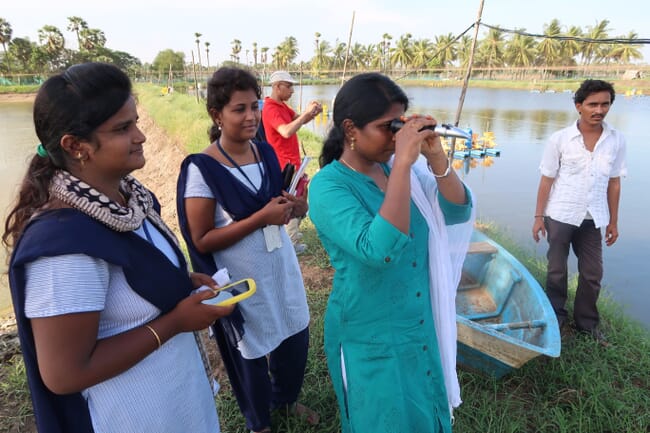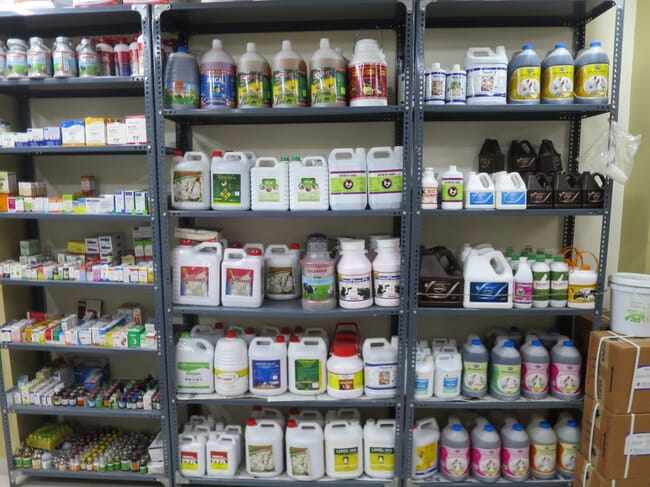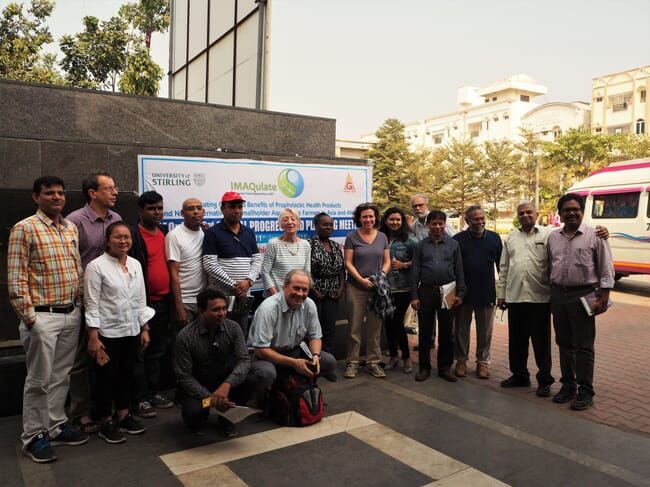The IMAQulate project, led by the University of Stirling with partners from these three countries as well as the UK, has assessed the use of prophylactic health products (PHPs), which are used routinely by aquaculturists to prevent disease. Over 800 PHPs have been recorded as being used and over 100 analysed, having been found on sale or in use across the Bangladesh, Kenya and the Indian states of Andhra Pradesh and West Bengal. In 2018-2019, the final year of the three-year project, the most promising products will be subjected to rigorous on-farm testing to assess their effectiveness and cost benefits in disease prevention. In addition, a range of novel prebiotics – from extracts of mangroves to seaweeds – will be assessed for possible immune modulatory properties.

The team are working with shrimp, tilapia and pangasius farmers. Globally, antibiotic use in farming is becoming increasingly regulated due to concerns over food safety and antimicrobial resistance. Global importers of fish and shellfish are imposing stringent bans on products containing antibiotic residues. Antibiotics may enter the products either directly through imprudent farming practices or indirectly through contaminated foodstuffs and other inputs and countries, most recently India, risk a complete ban on exports to the EU if measures are not taken to eliminate antibiotics from seafood products. India has seen rapid growth in its export-orientated shrimp farming sector and the accompanying potential for production intensification has also spurred a rush of new small-scale entrants, the primary stakeholder group targeted by the project. Due to their more limited diagnostic and health management capacities, the team hypothesise that such farmers may also be a higher risk group underlying antibiotic residue detections in export markets - a common phenomenon previously observed in other producer countries.
Alternatives to antibiotics
The antibiotics ban has opened a gap in the market for alternative products such as probiotics, prebiotics and immunomodulators, which are collectively known as PHPs. Probiotics are viable bacteria (including Bacillus, Lactobacillus and Pseudomonas) that have a beneficial effect on the microbial community in either the gut of the fish or the soil or water in which it is raised. Prebiotics promote the growth of such bacteria and are used either in conjunction with probiotic products or alone to promote the natural growth of commensal bacteria. Immunomodulators contain a variety of substances to boost the animal’s natural immune system. PHPs can be broadly divided into (i) ‘in-feed’ products designed to treat the culture animal’s ‘gut microbiome’ or the (ii) ‘soil & water’ treatment products for treatment of an analogous ‘pond microbiome’. Manufacturers claim a variety of health benefits for target species, including enhanced disease resistance, survival, growth and stress relief, and water quality benefits such as degradation of toxins, with many packages detailing a long list of diverse benefits.

Many studies have evaluated the effectiveness of PHPs but few of them have been independently substantiated under farm conditions. Therefore most product users depend on information provided by manufacturers, distributors, traders and technicians, the accuracy of which is subject to a range of potentially conflicting interests.
Alongside larger established multi-national manufacturers, the lightly regulated and lucrative market for PHPs has led to an influx of small-scale start-ups and products of unknown efficacy being sold freely to farmers. The cost of such unsubstantiated claims is borne disproportionately by smaller farmers that are especially prone to diseases challenges. Initial survey findings indicate that such farmers, who often lack disease diagnostic capacity, are much more likely to apply ‘soil and water’ than ‘in-feed’ probiotics. This is because, compared to disease determination, short-term improvements in water quality can be more readily observed or measured. However higher pond dosage and associated costs for soil & water probiotics means less well-resourced farmers are more likely to apply them therapeutically in response to adverse water quality indicators - contrary to manufacturer guidance on their intended prophylactic application.
Assessing the efficacy of PHPs
The IMAQulate project takes a three-pronged approach to tackling these problems. The first is to understand how farmers, as well as hatcheries and nurseries, use PHPs and also who or what influences these decisions. This involves understanding the market for such products, from manufacture to end-use, surveying over 1,000 stakeholders and key informants along the value-chain, and understanding the quality assurance, regulatory and policy environment of such products. Understanding the drivers of change among these farmers, as well as their capacity to make these changes, is key to understanding how the project can help them. Secondly, high potential products are to be analysed and tested through robust trials on hatcheries, nurseries and farms for health and survival outcomes. Finally, laboratory-based work will investigate the antimicrobial and/or immunomodulatory properties of natural products that are widely available and may hold potential for low-cost alternatives to antibiotics. A PHP ‘pedigree analysis’, based on a range of indicators including use-prevalence, certification of manufacturing quality assurance, laboratory analysis and expert opinion on product active ingredients against label claims, will provide the basis for short-listing ‘high-potential’ products for subsequent evaluation in farmer trials.
Collaborative effort
The project team will collaborate with commercial hatcheries, nurseries and farms in the three focus countries over the coming months to conduct trials of selected PHPs on fish and shrimp health. In India, this will be led by the Central Institute of Fisheries Technology and the University of Stirling in collaboration Ananda Group, a major Indian commercial shrimp producer and exporter based in Andhra Pradesh. In Bangladesh, WorldFish Bangladesh and Bangladesh Agricultural University are focusing on shrimp/prawn (Penaeus mondon/Macrobrachium rosenbergii), pangasius catfish and tilapia production systems and in Kenya, Machakos University and the Kenya Marine and Fisheries Research Institute have partnered with social enterprise Sidai and Victory Farms to focus on pond and cage tilapia systems.
Farmer trials of PHPs will be initiated at hatchery and nursery stages after which the health and production performance of treated stocks will be monitored through grow-out in ponds and cages. In India, a bio-floc nursery system will also be evaluated as a potential low cost alternative to ‘soil & water’ probiotics.

Alongside these efforts, the John Innes Centre, the Quadram Institute and the Royal Veterinary College in the UK, as well as Cochin University for Science and Technology and Kerala University for Fisheries and Ocean Science in India, are exploring the immune stimulatory properties of natural, widely-available products such as extracts of seaweeds and mangroves. The project will build on existing knowledge to identify products that are indigenous to and widely available in the focus countries, aiming to identify potential low-cost PHPs.
The outcomes of this project will be used to better inform farmers in the three focus countries and beyond of the efficacy of products on the market, allowing them optimise health management strategies consistent with their needs, resources and capacities. The findings will also allow for more informed policy and legislation surrounding the manufacture, sale and use of PHPs, ultimately leading to a more effectively regulated market and more profitable health management practices for farmers.
IMAQulate is funded by BBSRC Newton Fund, Department for Biotechnology (India) and the Department for International Development (DFiD).
For more information and collaboration contact
PI: Dr Francis Murray f.j.murray@stir.ac.uk
Postdoctoral researcher: Mahmoud El Tholth m.m.eltholth@stir.ac.uk
Administrator: Robyn Shilland robyn.shilland@stir.ac.uk

